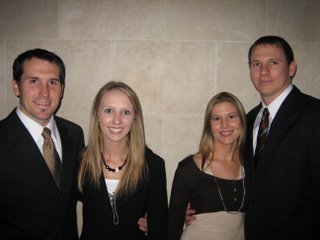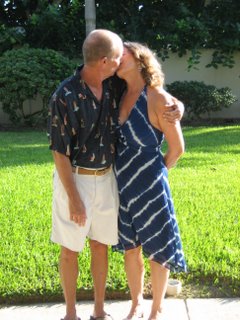Seeing how we don't have cable or basic TV, Lauren and I have been reduced to reading
books! While this isn't a bad thing, it is definitely something to get used to. Fortunately, it has been pretty easy to adjust. We figured we would provide some reviews of the books we've recently finished reading and a review on the "bookworm system" in Drew's honor. Each rating is out of a possible 5 worms.
1 worm = Don't bother. We feel for the trees killed to print this sorry thing.
2 worms = Ehh... don't bother unless you're locked up with nothing to do, and they took away your finger paints.
3 worms = Put this on your list, but not at the top.
4 worms = Definitely worth your while.
5 worms = Get up right now and go purchase (or borrow) this book! A must read!
24 Days, by Rebecca Smith & John R. Emshwiller
(4 Worms)
The Enron story has been thoroughly documented in numerous books and articles in the past few years. While I had a general idea of what brought down Enron from the numerous articles I had previously read, I was looking for an Enron book which would provide a detailed insider account of the unfolding events which eventually took down one of the largest corporations in America. This book caught my attention because it was written by two
Wall Street Journal-ists who were assigned to cover the story. It was said by some (including the authors) that they were the first major news outlet to uncover the scandals taking place at Enron. This book is the account of both reporters detailing the days that they spent investigating Enron's financial position, most notably the Fastow partnerships.
24 Days gave great detail of the reporters' difficulty in uncovering the partnerships and the very complex manner in which they were produced. The book also goes into account of Arthur Anderson turning a blind eye towards Enron's entire operation, even though they were aware of the huge conflicts of interest between Andy Fastow (being General Partner of the partnerships) and Enron. Overall, the book provided a great view on how the reporters gathered and collected evidence to report the biggest corporate scandal in American history. I would recommend this book to anyone interested in the details of how Enron was brought down, chiefly the Fastow partnerships, however the book gave very few details on many of the failed business ventures which also led to the eventual downfall of Enron. To further learn about this part of the story, I will be adding the book
Enron: The Smartest Men in the Room to my wish list. (I must say, the movie was pretty good.)
1776, by David McCullough
(4-1/2 worms)
This book was referred to me by my beloved siblings, Brad & Amity (everyone knows Felicity doesn't read). Actually, I even borrowed Amity's copy of the book from her extensive collection. This book details the American Revolution during... 1776 (who would have guessed?). I'm a big fan of history, particularly the accounts of wars, so this book definitely fit my interests. Having known only very general details of the American Revolution provided by my exquisite public education, this book was my first real education of what took place during the period of the American Revolution. The year 1776 was important in many respects because this was the turning point for the war. Everyone knows that the Declaration of Independence was signed in 1776, but who knew that the war waged on many years after that? (Sorry, Mom, for some reason I did not know that... but it helped that my wife didn't either... even though she also expressed how little she
cared.) This book provided insight into the character of George Washington and his very young and very inexperienced commanders. While the book got off to a slow start, it soon picked up after recounting the events of the battle for Boston, and from that point forward was a very fast read. McCullough did a great job in researching all the different accounts from the participants of the war to the media and newspapers. It was interesting reading the communication between British and American commanders, as well as gaining the insight of how during 1776, the "rebel fighters" were many times on the brink of losing. This book while at times praises Washington's resolve, also makes him out at other times to look like a fool. Let's just say that if Washington had his way, we would all be accustomed to having High Tea. It is my opinion that McCullough should write another book detailing the events leading up to the Treaty of Paris in 1783 so that we can further learn about the important events of the war after this important year he has detailed.
Neoconomy: George Bush's Revolutionary Gamble with America's Future, by Daniel Altman
(1/2 worm) -- Did not finish
This book, just by the title, in my mind would be a great read because there are a multitude of topics that could be covered under the changing of the economy and the position of Neo-conservatives. This book, however, did a poor job of outlining key topics and explaining conclusions. The book is dry, and in my opinion poorly written. As noted above, I was unable to finish the book because of how ineffective the author was in explaining his view and keeping the reader entertained. Hopefully someone else will pick this topic up and write a more intriguing account.
The next book on my list is
Plain Speaking: An Oral Biography of Harry S. Truman by Merle Miller, and
Bury my Heart at Wounded Knee by Dee Brown. Please feel free to respond with recommendations on other books to add to my list.

 But even though we got a bunch of ornaments as gifts, I couldn't help but buy a few of my own.
But even though we got a bunch of ornaments as gifts, I couldn't help but buy a few of my own. Can anyone figure out what the theme seems to be?! Apparently we're carrying the beach theme all year long into our Christmas celebration. But come on, Santa Claus and snowmen on a beach?! It really doesn't get any cuter than that!!
Can anyone figure out what the theme seems to be?! Apparently we're carrying the beach theme all year long into our Christmas celebration. But come on, Santa Claus and snowmen on a beach?! It really doesn't get any cuter than that!!


 Later we all sat down to Christmas dinner. It turned out really well, thanks to everyone's contributions. The menu consisted of: Ham, Company Mashed Potatoes, Asparagus, Ambrosia, and Green Salad. And luckily, we have LOTS of left-overs since we made so much! Actually, I'm headed to the kitchen now to warm up a plate for dinner. YUM!
Later we all sat down to Christmas dinner. It turned out really well, thanks to everyone's contributions. The menu consisted of: Ham, Company Mashed Potatoes, Asparagus, Ambrosia, and Green Salad. And luckily, we have LOTS of left-overs since we made so much! Actually, I'm headed to the kitchen now to warm up a plate for dinner. YUM!




































 All along the river, different property owners have installed rope swings from their trees which we had lots of fun swinging from. They installed ladders so you had to climb up onto the tree and swing off of it. And let me tell you, it seems much higher when you're up there than it looks from the ground!! It was very fun... luckily Floyd happened to know the owners of this particular property because they came over to find out why we were using their swing!! Turned out that since Floyd knew the guy, we all ended up swinging and hanging out, so what could have been a sticky situation turned out just fine! Hopefully you can see the blur that is Phil swinging into the water in the photo above.
All along the river, different property owners have installed rope swings from their trees which we had lots of fun swinging from. They installed ladders so you had to climb up onto the tree and swing off of it. And let me tell you, it seems much higher when you're up there than it looks from the ground!! It was very fun... luckily Floyd happened to know the owners of this particular property because they came over to find out why we were using their swing!! Turned out that since Floyd knew the guy, we all ended up swinging and hanging out, so what could have been a sticky situation turned out just fine! Hopefully you can see the blur that is Phil swinging into the water in the photo above.









